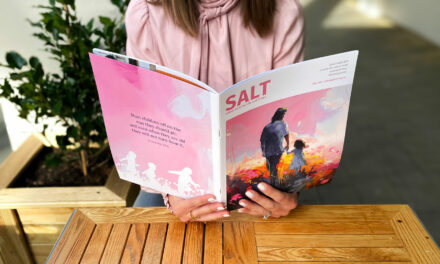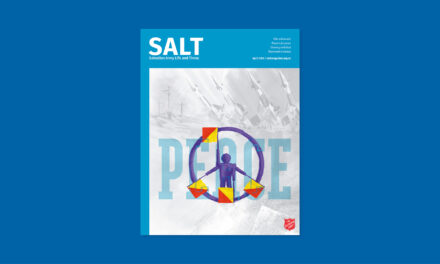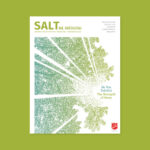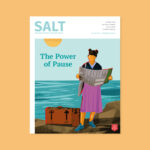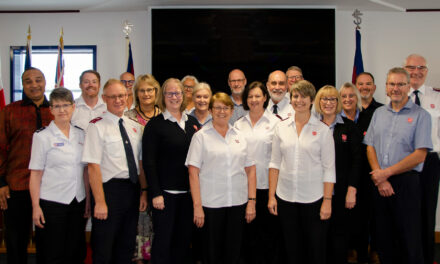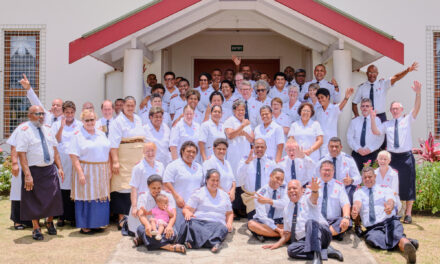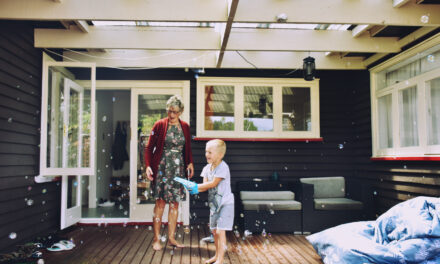
Shalom Together

Recently The Salvation Army’s Territorial Governance Board signed a kawenata (covenant) with members of the newly formed Rūnanga. For so long Māori have featured disproportionately in our welfare and addiction service statistics, but through the Rūnanga The Salvation Army believes that cycle can and is being broken. The vision is for Māori to flourish and thrive as active partners in the gospel and leaders within the movement. By embedding shared authority with Māori into our structure and upholding the promises of Te Tiriti o Waitangi (The Treaty of Waitangi) within the movement, The Salvation Army has a prophetic opportunity to model what shared authority can look like when it is rooted in covenantal relationship, founded on the good news of Jesus Christ, and built on trust and confidence between God’s people.
Territorial Commander Commissioner Mark Campbell shares how he got a few laughs when he preached on February 6 earlier this year. ‘There I was, an Australian introducing a Jewish word—shalom—on Waitangi Day,’ laughs Mark. ‘But I went on to say, in all seriousness, that’s what The Treaty of Waitangi was truly about—shalom together.’
Shalom is translated in English to mean peace, but in Hebrew it means so much more. In fact, in the Bible shalom is translated variously as wholeness, wellbeing, flourishing, complete restoration and also as restitution.
‘The Treaty was about everyone flourishing together,’ continues Mark. ‘It was never about the Crown and settlers flourishing and Māori not flourishing. That’s what has happened, but it wasn’t the intention. So, in the covenantal relationship between the Rūnanga and the Territorial Governance Board (TGB) it’s shalom together that we are aiming for. And we do that together in partnership with the gospel.’
Partners in the gospel
Bishop Te Kitohi Pikaahu (Ngāpuhi, Ngāti Kahu, Te Rarawa and Te Roroa) is the Anglican Bishop of Te Tai Tokerau (Northland and Auckland) and is highly regarded worldwide for his advocacy of indigenous people. In 2021 he was awarded the New Zealand Order of Merit for services to Māori.
In recent years, Bishop Kito has played a vital role in assisting with the review of The Salvation Army’s work and relationship with Māori—a challenging task but one Kito says he was privileged to be part of. In late 2022, following the conclusion of the review, Commissioner Mark approached the bishop with the hope he would accept an appointment to the TGB. While Kito initially accepted the role to help with what he describes as the transitional phase, from assessing the results of the review to implementing the recommendations, Kito confesses that it wasn’t long before his commitment to that task cemented his passion for the TGB’s vision for Māori. Charged with forming a new Rūnanga and establishing its terms of reference, Kito was appointed the chair and a nominations committee was formed. Rūnanga membership carefully evolved from there.
‘It is important,’ says Kito, ‘to consider the whakapapa (the origin) of the Rūnanga. It was established after many years and several attempts to recognise the rightful place of Māori in The Salvation Army. That whakapapa began as a vision of the kingdom of God in Aotearoa New Zealand. The place of Māori is identifiable by seeing the “face” and hearing the “voice” and sensing the “heart” of Māori throughout the movement and the wider Church. The language of Te Rongopai o Ihu Karaiti (the gospel of Jesus Christ) and Te Tiriti o Waitangi forms the foundation of the Rūnanga. It expresses the aspirations of the whole Church and the place of Māori.’
Mark speaks very highly of his wise friend and affirms not only the mana of the bishop as a leader of influence, but a true partner in the gospel.
‘The Bible shows us that the early Church worked together as partners in the gospel—no church was greater than another. For myself, and I believe for Kito, we see each other as partners in the gospel first and foremost. No one is greater than the other, because we are one in Christ. The covenantal relationship between the Rūnanga and the governance board is now cemented, and we are intrinsically connected with one another,’ explains Mark.
A covenant of shared authority
A key piece of work the TGB has undertaken is defining what shared authority means for The Salvation Army.
Kito reminds us that in 1840 when the nation of New Zealand was founded by the signing of the Treaty of Waitangi, the power dynamics were completely different to what they are today. ‘Māori had all the power and authority, but they decided to share that power and authority with the Crown and the settlers. Māori offered to share authority as an act of generosity and hospitality. So if we consider that beginning and view Ti Tiriti o Waitangi within its proper context, it was about shared authority. There was goodwill on the part of Māori at the beginning with the representatives of the Queen. The Salvation Army is now saying to Māori within the movement that we want to reciprocate that initial offer to share authority.’
Both Mark and Kito emphasise that the covenant between the TGB and the Rūnanga is a clear sign of mutual sharing of authority.
Kito explains that the accountability for this covenantal relationship is with Scripture, Christian tradition, history and God’s ongoing revelation. ‘What does the Bible say about what it means to live in harmony with each other? Where in the history and tradition of the Church do we see God’s people nurtured and how were they able to flourish? What is the Spirit saying to the Church today in terms of its mission and ministry within the structures of the Church?’
Mark puts it simply and frankly when he uses the example of covenantal trust in a marriage to explain what shared authority looks like in The Salvation Army.
‘Generally speaking, you don’t go off and spend $20,000 on a holiday to America and plan to leave next week and be away for a fortnight, without discussing this first with your partner. You just don’t do that. You don’t do anything that affects your partner without having a conversation first. I’ve learnt that it’s good to do this around kai (food). And if you don’t agree, you continue to engage by listening. There’s no over-ruling each other. You allow enough time to come to some sort of agreement. This is how governance generally works here in the territory. Only once in four years have we had to vote on something. Just once. It’s a collaboration of listening and teasing the issue out until we settle on something together.’
Kito affirms his belief that significant progress has been made. ‘I am warm to the notion that … the governance board resolved several years ago to establish the Rūnanga. It delegated oversight and certain governance responsibilities for mission and ministry to Māori within The Salvation Army to the Rūnanga. That covenantal relationship is founded on the good news of Jesus Christ and is built on trust and confidence between the two bodies.’
Fresh winds of the Spirit
Dr Gina Colvin (Ngāpuhi/Ngāti Porou) was nominated for the Rūnanga by Major Christine DeMaine (Hēkeretari-Ā-Wehenga Te Waipounamu, Manatū Māori). ‘Part of being Māori,’ explains Gina, ‘is paying careful attention to those who have something to offer the collective. We tend not to push ourselves forward so much as observe each other and then strategically position people in the tribe. Christine thought I had something to offer.’
With a PhD and a background in education and academia, Gina was a lecturer in Māori Sociology at Canterbury University for many years. An author and a podcast host, she also has a master’s degree in theology through Laidlaw College. Currently Gina serves as Pou Arahi Ki Otautahi for The Salvation Army’s Addictions, Supportive Housing and Reintegration Services (ASARS), and is based in Christchurch.
As a Rūnanga member, Gina says ‘the ngakou—the real essence of the issue—is having the conversation around how we see Māori in the Church. I’m passionate about us being Māori in our own Christian mana. In terms of The Salvation Army’s specialised services, it’s about moving the dialogue away from service delivery to whānau (family) capability development.’
Gina is also passionate about contextual theology because it calls people of faith to make room for other expressions of the gospel. Quoting Michael Oleska, Gina says, ‘While “most Christians know where Christ is, they can never be certain of where he is not”. We see throughout the history of the Christian movement this persistent struggle to be faithful when Christ is made manifest in new ways and new contexts. If we lock our understanding of where the Spirit is working down into only familiar contexts, well, we’re not working with the Spirit anymore, just ego. It’s important to be open to the fresh winds of the Spirit.’
Kito affirms this when he says, ‘Through the Rūnanga, The Salvation Army wants to see Māori thrive and flourish in the life and witness of the church. This direction empowers and enables Māori to be valued within its structures and operations. It encourages Māori to contribute at every level of the church, and to bring their gifts and talents for the building up of the kingdom of God in this and every generation.’
Mark, Kito and Gina were delighted that the first words spoken at the official welcome for the newly elected International Leader of The Salvation Army, General Lyndon Buckingham, were in te reo Māori. Cloaked in korowai and presented with pounamu taonga by members of the Rūnanga, the lifting of Māori—and indeed all indigenous cultures around the world—revealed the fresh winds of the Spirit at work across the international Salvation Army.
A vision of the future
Mark is passionate about a vision of shalom together for everyone in the New Zealand, Fiji, Tonga and Samoa Territory of The Salvation Army.
‘We are four nations in this territory so our territorial leadership must be reflective of our four nations, because first and foremost we are partners in the gospel. For New Zealand that means understanding that we were founded as a bicultural nation, and The Salvation Army is committed under God to upholding the promises of the Treaty of Waitangi,’ Mark affirms.
‘I believe that one day in the not too distant future we will have leaders from all four nations at the helm of the territory. There’ll be a secretary for mission who is Māori. And a personnel secretary who is Tongan—won’t that be something to celebrate! And Fijian, Tongan and Samoan Salvationists leading in all three Pacific nations. That’s where we are headed. Everyone is thriving and flourishing. Shalom together.’

